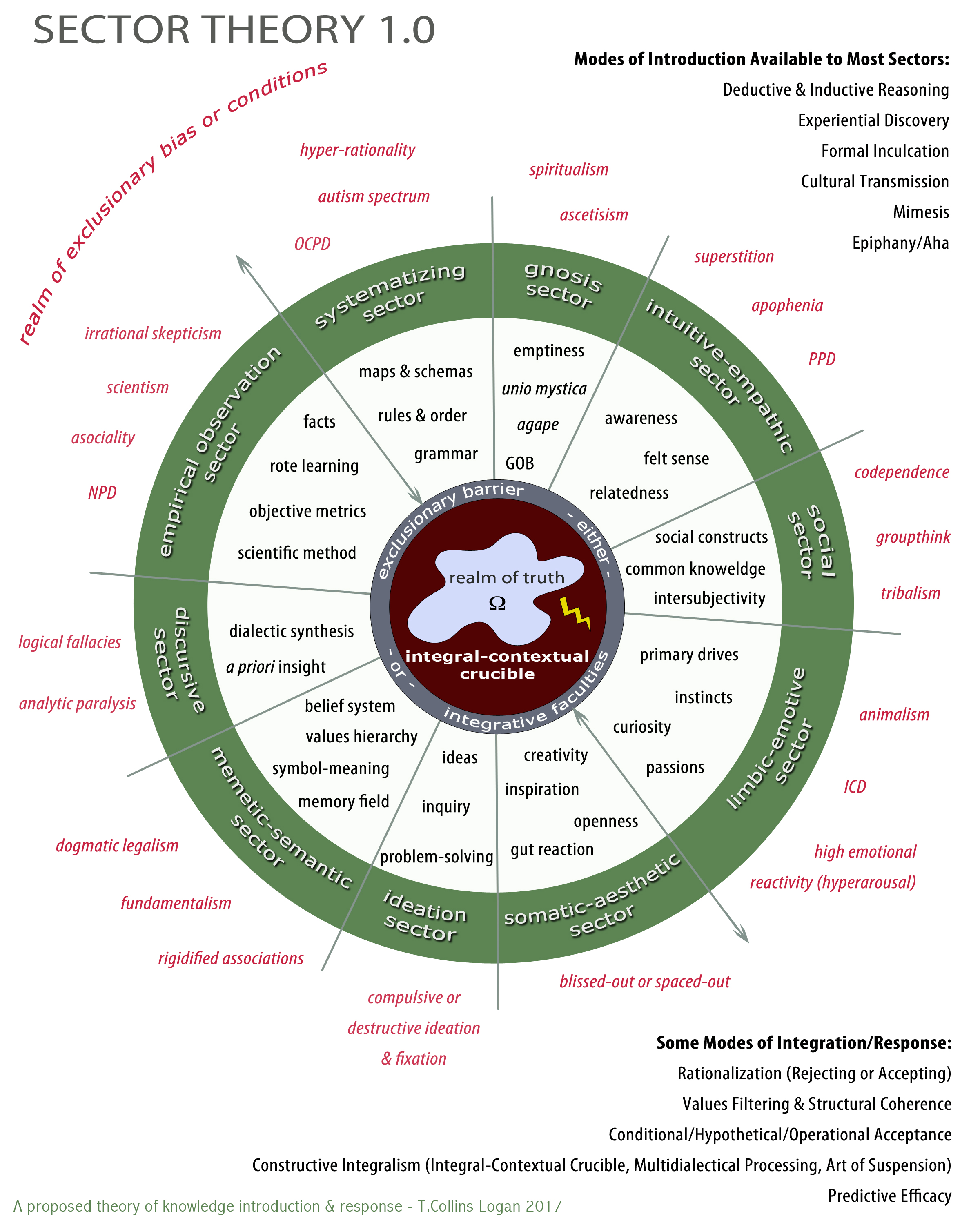How do you model high-level dialectical thinking?
Posted by T.Collins Logan on
This has been a central focus of my own philosophical reading, research, musings, and writing for many decades. It took me a while to arrive at these conclusions…but what follows is where I have landed for the moment.
I should first give a nod to the lineage of the dialectical epistemic mode in Western philosophy, where we see the primary evolution from Plato and Aristotle up through Hegel. I also think Calvinist multiperspectivalism adds to this tradition, with a synthesis of three perspectives. Beginning with Gebser we begin to see a new definition of “multiperspectival” among integral philosophers, and really this is the beginning of what I would call “high-level dialectical thinking.” In this form of analysis, many perspectives contribute to an additive synthesis.
Finally, there is a parallel lineage in Eastern philosophy and mysticism as well, which leads to subtly different epistemic assumptions: that some understanding can’t be logically derived, but only “known” in a more felt or spiritual sense, described with terms like “gnosis,” “kensho,” and “bodhi.” This illuminating awareness also encompasses multiple perspectives in its interpenetrating understanding — it can integrate without negation just as Western dialectical and integral methods attempt to do.
This is not to say that Western philosophy doesn’t brush up against sympathetic ideas — it does. I think arriving at Aristotle’s moderation, or Fichte’s intellectual intuition, or Heinlein’s “grok” all seem to require a similar flavor non-analytical insight.
All of this led me to a very particular conclusion: there are many ways of knowing, and many ways of integrating that knowledge, so that a true “synthesis” of understanding that encompasses all experiences, insights, and perspectives requires a different framing than what either Western or Eastern philosophical traditions had to offer alone.
This is how I arrived at Sector Theory, an overview of which is represented in the graphic below. This epistimic framework is still under development (I’m currently working slowly on version 2.0), but you can read a summary of version 1.0 here: https://www.academia.edu/32747714/Sector_Theory_1_0_Todds_Take_on_Epistemology

Sector Theory is how I would represent “high-level dialectical thinking.” The term I like to use for the fundamental process is “multidialectical synthesis.” What makes Sector Theory unique, however, are the definitions of the sectors themselves. These sectors aren’t always equal contributors — it requires discernment and wisdom to know which combination of sectors should have primacy in a given situation or realm of understanding — but Sector Theory asserts that all should be considered and weighed carefully together for the most complete understanding possible.
My 2 cents.
I should first give a nod to the lineage of the dialectical epistemic mode in Western philosophy, where we see the primary evolution from Plato and Aristotle up through Hegel. I also think Calvinist multiperspectivalism adds to this tradition, with a synthesis of three perspectives. Beginning with Gebser we begin to see a new definition of “multiperspectival” among integral philosophers, and really this is the beginning of what I would call “high-level dialectical thinking.” In this form of analysis, many perspectives contribute to an additive synthesis.
Finally, there is a parallel lineage in Eastern philosophy and mysticism as well, which leads to subtly different epistemic assumptions: that some understanding can’t be logically derived, but only “known” in a more felt or spiritual sense, described with terms like “gnosis,” “kensho,” and “bodhi.” This illuminating awareness also encompasses multiple perspectives in its interpenetrating understanding — it can integrate without negation just as Western dialectical and integral methods attempt to do.
This is not to say that Western philosophy doesn’t brush up against sympathetic ideas — it does. I think arriving at Aristotle’s moderation, or Fichte’s intellectual intuition, or Heinlein’s “grok” all seem to require a similar flavor non-analytical insight.
All of this led me to a very particular conclusion: there are many ways of knowing, and many ways of integrating that knowledge, so that a true “synthesis” of understanding that encompasses all experiences, insights, and perspectives requires a different framing than what either Western or Eastern philosophical traditions had to offer alone.
This is how I arrived at Sector Theory, an overview of which is represented in the graphic below. This epistimic framework is still under development (I’m currently working slowly on version 2.0), but you can read a summary of version 1.0 here: https://www.academia.edu/32747714/Sector_Theory_1_0_Todds_Take_on_Epistemology

Sector Theory is how I would represent “high-level dialectical thinking.” The term I like to use for the fundamental process is “multidialectical synthesis.” What makes Sector Theory unique, however, are the definitions of the sectors themselves. These sectors aren’t always equal contributors — it requires discernment and wisdom to know which combination of sectors should have primacy in a given situation or realm of understanding — but Sector Theory asserts that all should be considered and weighed carefully together for the most complete understanding possible.
My 2 cents.
Trackbacks
Trackback specific URI for this entryThis link is not meant to be clicked. It contains the trackback URI for this entry. You can use this URI to send ping- & trackbacks from your own blog to this entry. To copy the link, right click and select "Copy Shortcut" in Internet Explorer or "Copy Link Location" in Mozilla.
No Trackbacks
The author does not allow comments to this entry

Comments
Display comments as Linear | ThreadedNo comments